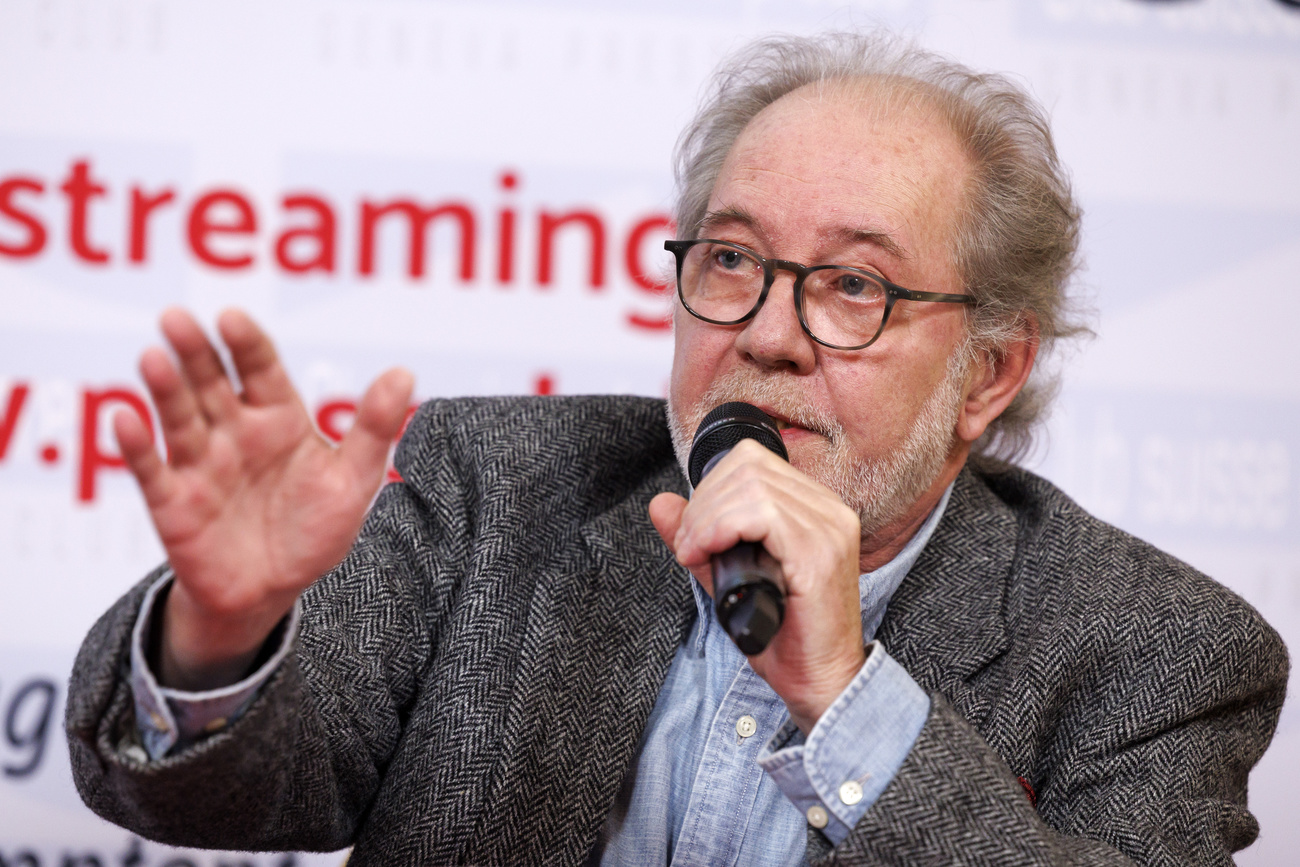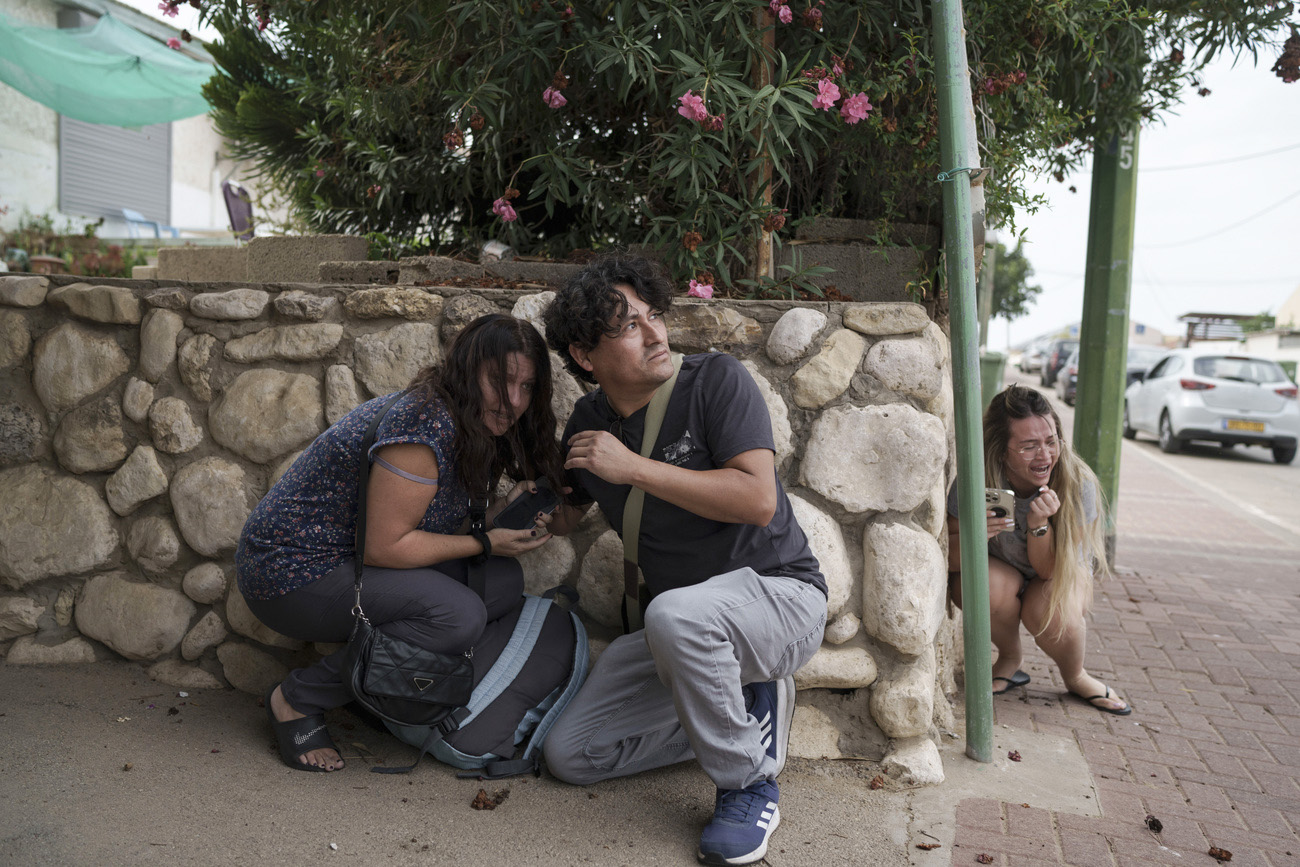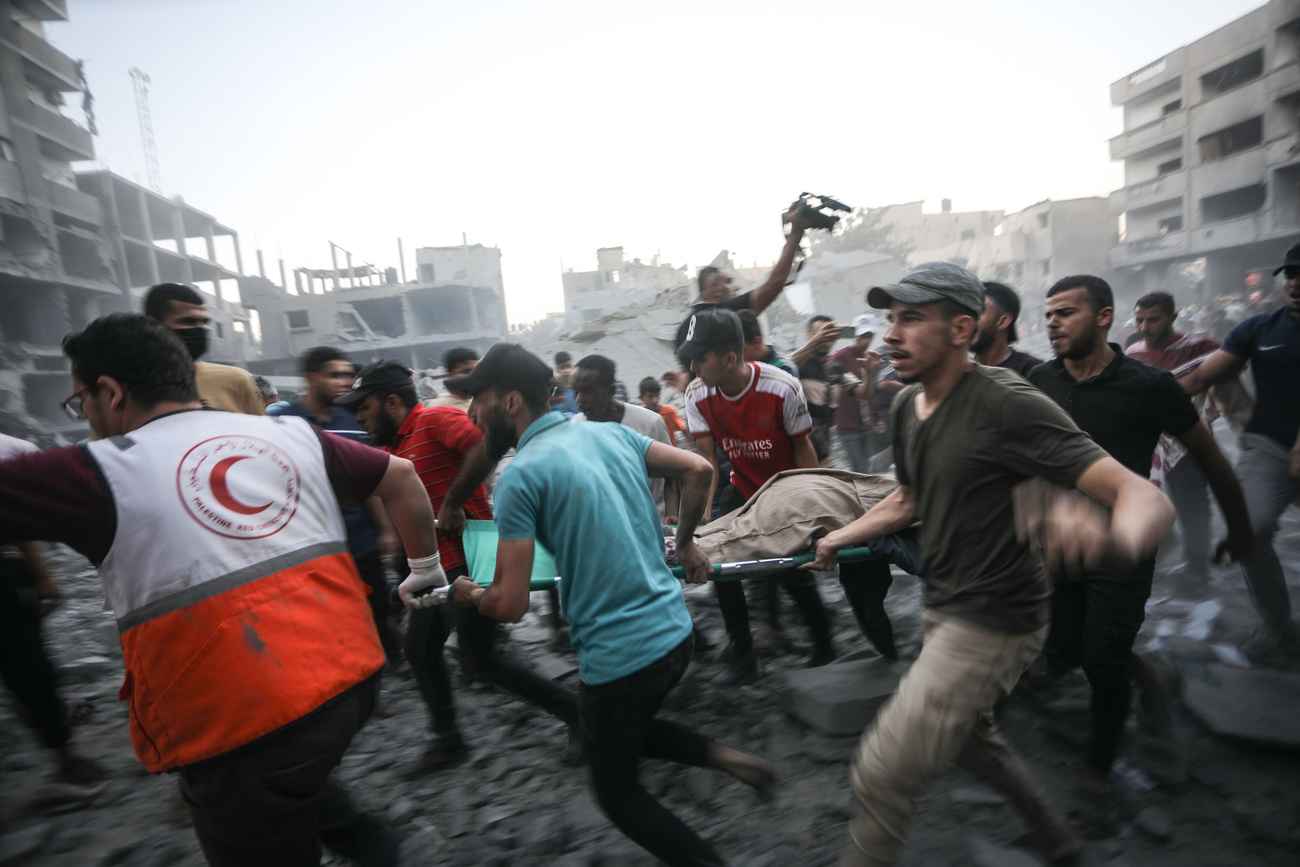
‘Declaring Hamas a terrorist organisation contradicts Switzerland’s neutrality’

Switzerland has nothing to gain by labelling Hamas a terrorist organisation, argues Riccardo Bocco, Middle East expert at the Graduate Institute in Geneva in an interview with SWI swissinfo.ch.
In the wake of the Hamas attacks in Israel, Switzerland is considering naming the Palestinian militant group a terrorist organisation, in line with the European Union, Canada and the United States. SWI spoke to Bocco to understand what that would mean for Switzerland and what role the Alpine nation could have in a peace process.
SWI swissinfo.ch: Switzerland has a history of serving as an intermediary between Hamas and Israel. The government has said it is considering labelling Hamas a terrorist organisation. Is it still in a position to mediate the release of Israeli hostages?
Riccardo Bocco: Switzerland’s previous engagement with Hamas, despite its global perception, allowed it to mediate previous conflicts and negotiations effectively due to its neutral stance. The shift towards declaring Hamas a terrorist organisation contradicts Switzerland’s historical neutrality and mediating role. It potentially hampers its capacity to navigate and mediate future regional conflicts and negotiations, such as releasing hostages or facilitating dialogues between conflicting parties.

SWI: The United Nations and human rights NGOs have accused both Israel and Hamas of war crimes. How should Switzerland diplomatically position itself?
R.B: Switzerland should leverage its traditional neutrality and play an intermediary role without siding with either Israel or Palestine. It’s plausible to acknowledge that both parties may have committed war crimes, as seen in Hamas’s actions and Israel’s responses. Switzerland can provide valuable service by cautioning against potential intensifications, such as a land invasion by Israel in Gaza, while highlighting the risk of further escalating war crimes. But to execute this, the Swiss foreign ministry must possess the requisite strength and resolve, which is a concern given its current perceived weakness.
SWI: What do you mean by weakness?
R.B: After the Oslo Accords in 1993 (signed between Israel and the Palestine Liberation Organization), Switzerland developed a cadre of diplomats who effectively engaged in Palestine. Today there is no longer that political will. There are fewer Swiss diplomats, and they are less well prepared. This poses a substantial problem for Switzerland’s diplomatic endeavours in the region.
SWI: Given the Israeli complete siege of Gaza, how should Switzerland assist to ensure aid reaches those most in need?
R.B: Gaza’s population is over two million, and the vast majority of them are refugees aided by UNRWA (the United Nations Relief and Works Agency for Palestine Refugees in the Near East), funded in part by Switzerland. Thus, Switzerland should steadfastly support UNRWA, the only UN agency dedicated to assisting Palestinian refugees with humanitarian aid, unlike UNHCR, which mandates legal protection. It’s crucial to note that the region’s over six million Palestinian refugees lack legal protection from any agency, making them uniquely vulnerable globally.
UNHCR (United Nations High Commissioner for Refugees) and UNRWA (United Nations Relief and Works Agency for Palestine Refugees in the Near East) both deal with refugee-related issues but have distinct mandates and areas of operation, especially concerning Palestinians:
1. Mandate:
• UNHCR: Established in 1950, its primary purpose is to protect and support refugees worldwide. It offers assistance to refugees, stateless persons, and, in some cases, internally displaced persons (IDPs) regardless of their nationality or origin.
• UNRWA: Founded in 1949, its exclusive mandate is to provide assistance, protection, and advocacy specifically for Palestinian refugees who lost their homes and livelihoods due to the 1948 Arab-Israeli conflict.
2. Operational Regions:
• UNHCR: Operates globally in various countries affected by displacement.
• UNRWA: Operates specifically in five areas: the West Bank, Gaza Strip, Jordan, Lebanon and Syria.
3. Definition of Refugees:
• UNHCR: A refugee is someone who has been forced to flee their country because of persecution, war or violence. The 1951 Refugee Convention provides the primary definition used by the UNHCR.
• UNRWA: Uses a more specific definition. A Palestinian refugee is a person “whose normal place of residence was Palestine during the period 1 June 1946 to 15 May 1948, and who lost both home and means of livelihood as a result of the 1948 conflict.”
4. Services:
• UNHCR: Provides legal protection, asylum-seeking procedures, camps, emergency response and resettlement services.
• UNRWA: Offers a broad range of services, including education, healthcare, social services, infrastructure and camp improvement, microfinance, and emergency response.

SWI: Some of Switzerland’s political parties are pushing the government to reconsider its assistance and relationships with UNRWA and Palestinian organisations. Would this lead to Switzerland revising or even curtailing humanitarian aid to Gaza and the West Bank?
R.B: Diplomatically, if Switzerland reduces humanitarian aid, it would be akin to “committing suicide”. On what basis would they halt humanitarian aid? Allegations that Hamas is diverting money destined for aid cannot be substantiated. The allocation of international assistance in Gaza has evolved into a sophisticated mechanism, ensuring thorough checks regarding the recipients and expenditure of the funds. The European Union, which contributes significant financial assistance, utilises a specific mechanism, called PEGASE, to ensure funds reach the intended associations and institutions. Therefore, while financial mismanagement may exist, any allegations should be supported with clear examples rather than propagating unverified claims.
SWI: What possible political solution do you see for viable peace in the region?
R.B: Today, a viable two-state scenario seems implausible. The current Israeli logic adheres to one state. From a legal perspective, Israel has formulated laws in its administration of the occupied territories that discriminate, separate and displace the Palestinian people. The issue of racial discrimination in Israel has been increasingly prominent since 2017 when the UN published a report accusing Israel of apartheid on the Palestinian population.
The failure of the two-state solution, illustrated by the struggles of the Geneva Initiative [an initiative pushed by Israeli and Palestinian civil societies launched in 2003], suggests that alternative solutions, like a federalist model, warrant consideration. Exploring new peacebuilding models like federalism hinges significantly on the willingness of involved parties to navigate through established political and territorial stances. This complex and multifaceted issue demands international and local engagement.
SWI: What are the alternatives for a viable solution and within what framework?
R.B: Various Palestinian and Israeli organisations are exploring alternative models. These include a “one democratic state solution”, a “bi-national state” and a “federation”. However, discussing these options in detail and moving towards any of them is currently challenging due to the ongoing war. It’s essential to await the outcome of the present war to explore these options further.
SWI: Could you explain the difference between a “one democratic state” and a “bi-national state”?
R.B: It’s about the juridical and constitutional architecture of the state. Israel, defining itself as a Jewish democratic state without a complete constitution, navigates delicate religious and political balances. A “one democratic state” would necessitate equal status for all citizens, both Jewish and Palestinian, and a defined constitution ensuring equal rights. In contrast, a “bi-national state” might provide different political structures for both national groups but needs careful planning to avoid internal conflicts and ensure equitable representation and rights for all. Exploring these models requires careful consideration of the diverse religious and political perspectives present in the region.
A “bi-national state,” implies recognising the right to self-determination for both Israeli Jews and Palestinians, a point which, surprisingly, has never been officially declared. In its 2018 nation-state bill, Israel declared that only Jewish Israelis have the right to self-determination. However, the right to self-determination was vital during decolonisation in other regions like Africa and India.
SWI: So, to wrap up, considering everything discussed about a possible political solution and Switzerland’s evolving role, what lessons from the past can we implement today?
R.B: Reflecting on past efforts, such as those following the Oslo Accords, there is a significant lesson about the importance of rigorous adherence and enforcement of international law in peacebuilding processes. Despite agreements, actions such as the substantial increase in land confiscation by Israel after 1994 occurred without significant international intervention or consequence. There was a failure from Europe and the United States to ensure that the involved parties adhered strictly to international law and norms. The substantial takeaway is holding entities accountable. They need to uphold legal and ethical standards by allowing neither geopolitical nor diplomatic relationships to soften the insistence on lawful and fair practices in international conflict resolution.
Edited by Virginie Mangin-ds/ML

In compliance with the JTI standards
More: SWI swissinfo.ch certified by the Journalism Trust Initiative





























You can find an overview of ongoing debates with our journalists here . Please join us!
If you want to start a conversation about a topic raised in this article or want to report factual errors, email us at english@swissinfo.ch.